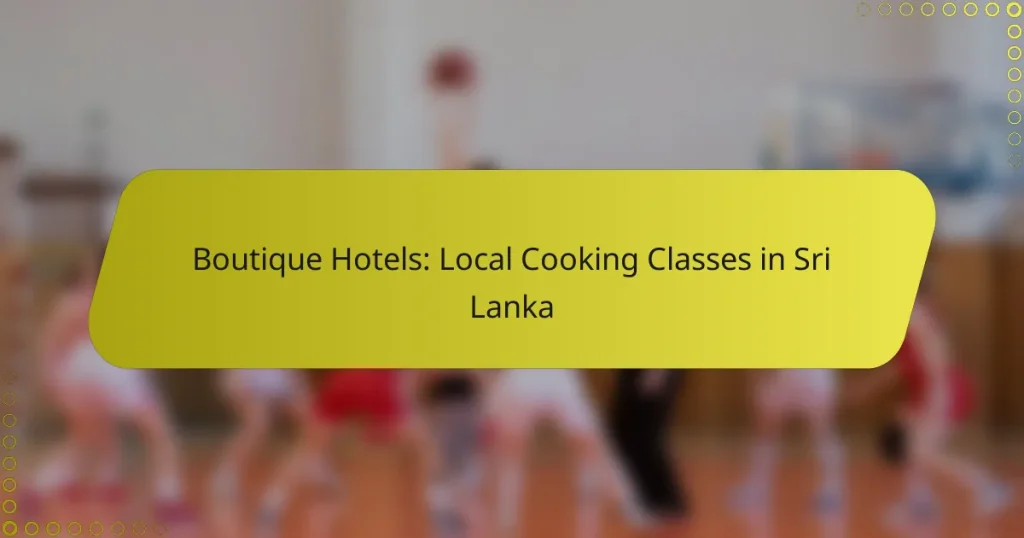Sri Lanka is home to a selection of boutique hotels that offer unique cooking classes, immersing guests in the island’s vibrant culinary traditions. These classes provide hands-on experiences with local ingredients and traditional recipes, ensuring a memorable and authentic taste of Sri Lankan cuisine. Whether you’re interested in seafood specialties or vegetarian dishes, there’s a class to suit every palate.
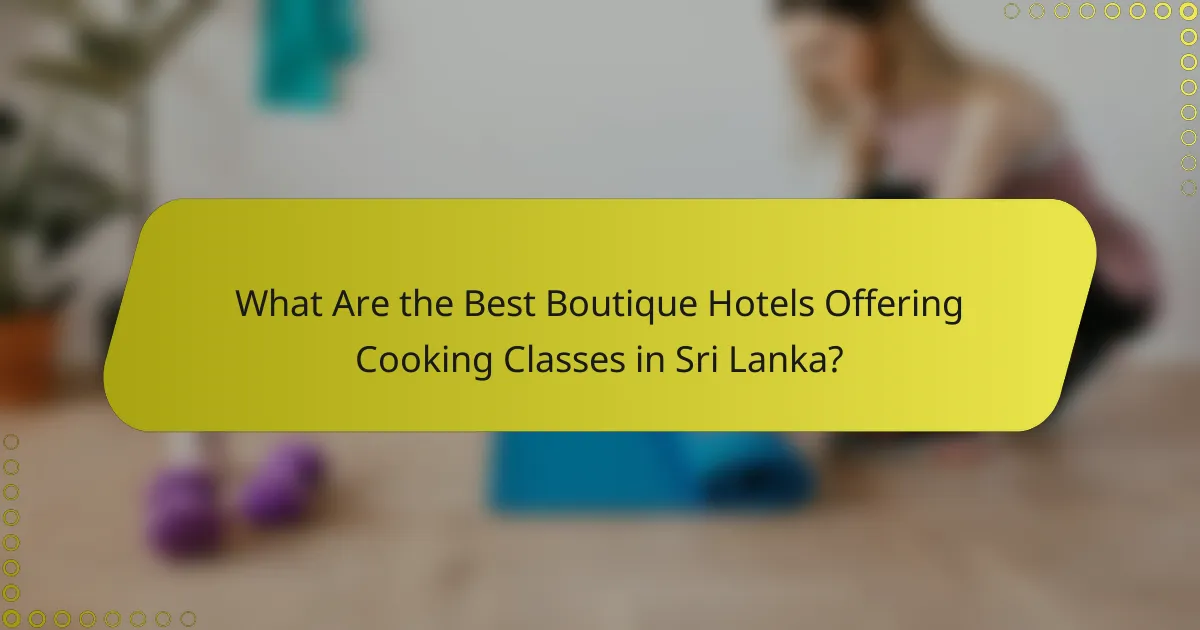
What Are the Best Boutique Hotels Offering Cooking Classes in Sri Lanka?
Sri Lanka boasts several boutique hotels that provide immersive cooking classes, allowing guests to explore the island’s rich culinary heritage. These experiences often include hands-on instruction, local ingredients, and traditional recipes, making them a highlight of any stay.
Amangalla
Located in Galle, Amangalla offers an elegant setting for culinary enthusiasts. Their cooking classes focus on traditional Sri Lankan dishes, utilizing fresh, local produce from nearby markets. Participants can expect to learn about spices, preparation techniques, and the cultural significance of each dish.
Classes typically last a few hours and include a market tour, where guests can select ingredients. This immersive experience not only enhances cooking skills but also deepens understanding of Sri Lankan culture.
Cape Weligama
Cape Weligama, perched on the southern coast, features a unique culinary program that emphasizes coastal cuisine. Guests can join chefs in preparing seafood dishes, learning about sustainable fishing practices and local flavors. The classes are designed to be both educational and enjoyable, often concluding with a meal enjoyed with fellow participants.
Classes are usually scheduled several times a week, making it easy for guests to fit them into their itinerary. The stunning ocean views add to the overall experience, creating a memorable cooking adventure.
Tea Factory Hotel
Set in the picturesque hills of Nuwara Eliya, the Tea Factory Hotel offers cooking classes that highlight the region’s tea culture. Guests can learn to incorporate tea into various dishes, from savory to sweet, while also exploring the history of Sri Lankan tea production.
Classes are intimate, allowing for personalized instruction. Participants often leave with new recipes and a deeper appreciation for the art of cooking with tea, making it a unique culinary experience.
Jetwing Lighthouse
Jetwing Lighthouse, located in Galle, provides a vibrant culinary experience focused on traditional Sri Lankan cuisine. Their cooking classes often feature a variety of dishes, including curries and sambols, with an emphasis on using local spices and herbs.
Classes are typically held in a well-equipped kitchen and are led by experienced chefs. Participants can expect to learn not only cooking techniques but also the stories behind the dishes, enhancing their culinary journey.
Uga Residence
Uga Residence in Colombo offers a sophisticated cooking class experience that blends local and international flavors. Guests can participate in hands-on sessions that cover a range of dishes, from traditional Sri Lankan fare to modern fusion cuisine.
Classes are designed to be interactive and engaging, often including wine pairings and discussions about ingredient sourcing. This approach not only teaches cooking skills but also fosters a deeper connection to the culinary arts.
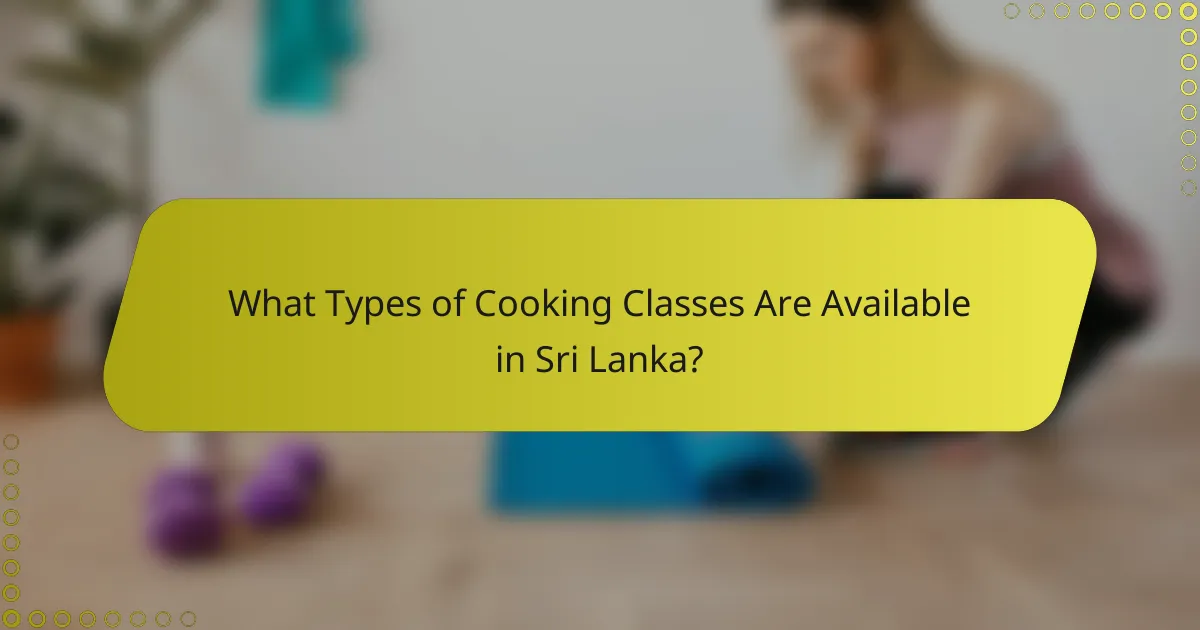
What Types of Cooking Classes Are Available in Sri Lanka?
Sri Lanka offers a variety of cooking classes that cater to different culinary interests, including traditional dishes, seafood specialties, and vegetarian options. These classes typically emphasize hands-on experience, allowing participants to learn authentic recipes and cooking techniques from local chefs.
Traditional Sri Lankan Cuisine
Traditional Sri Lankan cuisine classes focus on the island’s rich culinary heritage, featuring dishes like rice and curry, hoppers, and sambols. Participants learn to use local spices and ingredients, often sourced from nearby markets, to create flavorful meals.
Classes usually last a few hours and include both cooking and tasting sessions. It’s common for chefs to share stories about the cultural significance of each dish, enhancing the learning experience.
Seafood Cooking Classes
Seafood cooking classes in Sri Lanka highlight the abundance of fresh fish and shellfish available along the coast. Participants can expect to learn techniques for preparing popular dishes such as prawn curry and grilled fish, often using ingredients like coconut milk and tamarind.
These classes may include a market visit to select fresh seafood, providing insight into local fishing practices. It’s advisable to check for seasonal availability, as certain seafood may be more accessible at different times of the year.
Vegetarian Cooking Classes
Vegetarian cooking classes focus on plant-based dishes that showcase Sri Lanka’s diverse vegetables, legumes, and grains. Participants will learn to prepare meals like lentil curry and vegetable stir-fry, emphasizing the use of local spices and herbs.
These classes are suitable for all skill levels and often cater to dietary preferences, making them a popular choice for health-conscious travelers. Look for classes that offer a comprehensive approach, including information on nutrition and sustainable cooking practices.
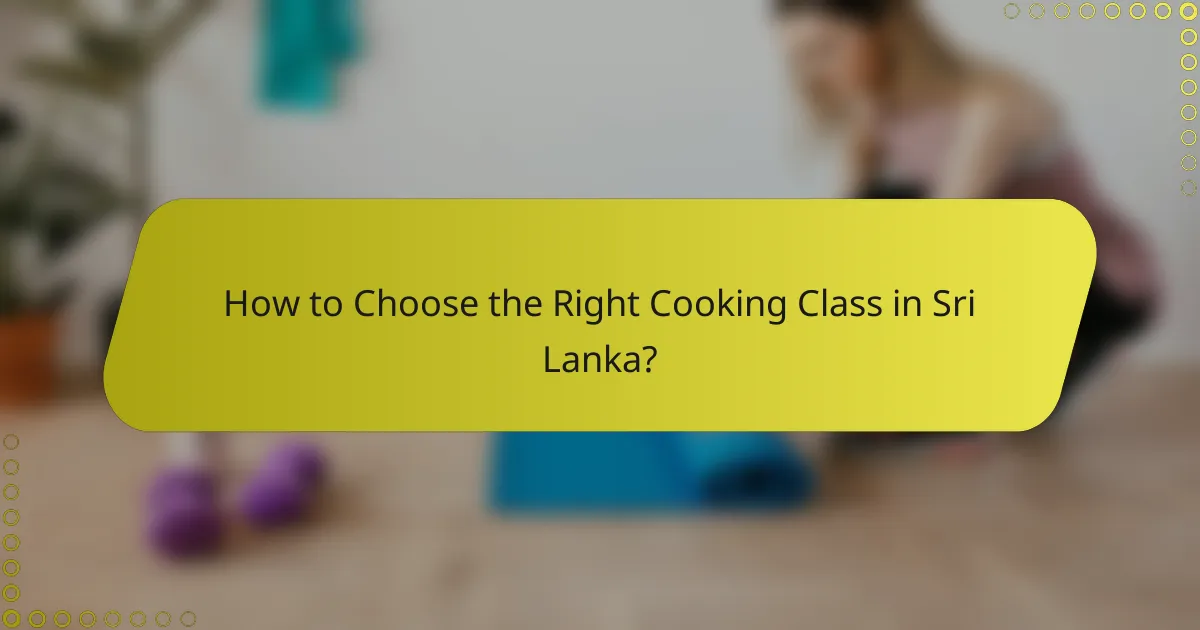
How to Choose the Right Cooking Class in Sri Lanka?
Choosing the right cooking class in Sri Lanka involves considering factors such as class size, instructor credentials, and class duration. These elements will significantly impact your learning experience and enjoyment of local cuisine.
Consider Class Size
The size of the cooking class can greatly influence your ability to learn and interact. Smaller classes, typically with 5-10 participants, allow for more personalized attention from the instructor, enhancing your cooking skills.
In contrast, larger classes may offer a more social atmosphere but can limit individual guidance. If you prefer hands-on learning, opt for a class with fewer students to ensure you receive adequate support.
Check Instructor Credentials
Instructor credentials are crucial in determining the quality of your cooking class. Look for chefs with formal training or extensive experience in Sri Lankan cuisine, as they can provide authentic insights and techniques.
Additionally, consider instructors who have received positive reviews or have been featured in culinary publications. This can indicate their expertise and ability to teach effectively.
Evaluate Class Duration
Class duration varies widely, typically ranging from a few hours to a full day. Shorter classes may focus on specific dishes, while longer sessions often cover a broader range of techniques and recipes.
When choosing, think about your schedule and how much time you can dedicate. A longer class may provide a more comprehensive understanding of Sri Lankan cooking, while a shorter one can still be rewarding if you’re pressed for time.
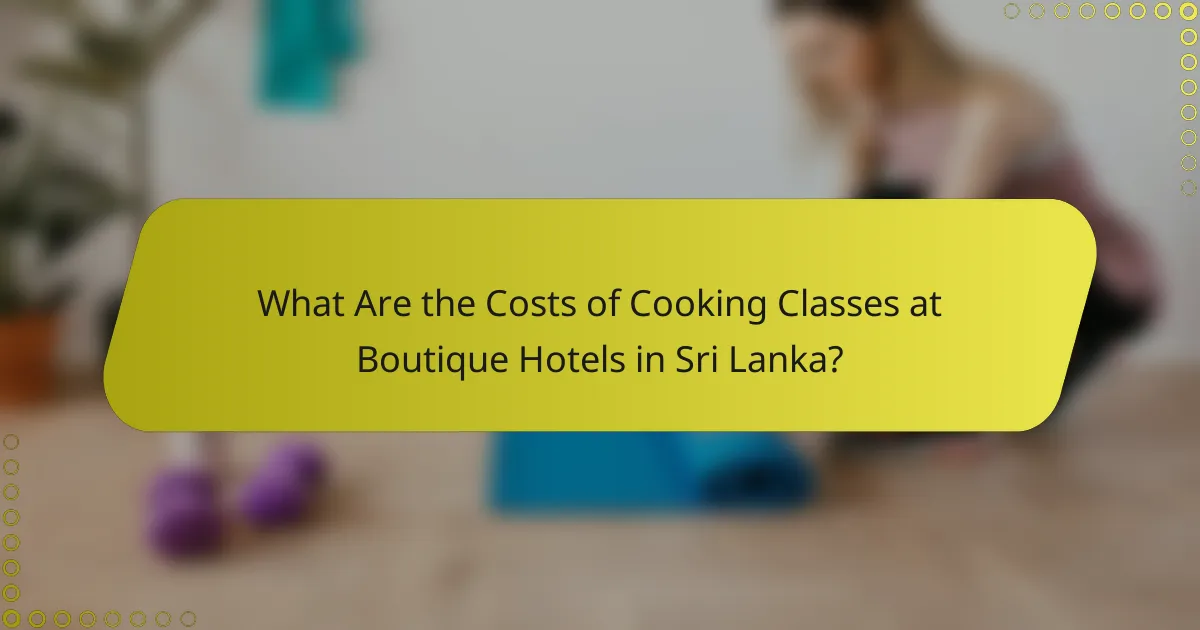
What Are the Costs of Cooking Classes at Boutique Hotels in Sri Lanka?
The costs of cooking classes at boutique hotels in Sri Lanka can vary significantly based on the hotel’s location, the class duration, and the complexity of the dishes taught. Generally, you can expect to pay anywhere from LKR 5,000 to LKR 15,000 per person for a single class.
Average Price Range
The average price range for cooking classes at boutique hotels in Sri Lanka typically falls between LKR 7,000 and LKR 12,000. This price usually includes ingredients, instruction, and sometimes a meal featuring the dishes prepared. Some hotels may offer discounts for groups or families, making it more affordable for larger parties.
When considering the cost, keep in mind that classes focusing on traditional Sri Lankan cuisine may be priced higher due to the unique ingredients and techniques involved. Always check what is included in the fee to avoid unexpected costs.
Package Deals with Hotel Stays
Many boutique hotels in Sri Lanka offer package deals that combine accommodation with cooking classes, providing a more economical option. These packages can range from LKR 20,000 to LKR 40,000 for a two-night stay, including one or two cooking classes.
Opting for a package deal can enhance your experience, as it often includes additional perks like guided market tours or complimentary meals. Be sure to inquire about the specifics of each package, as offerings can vary widely between hotels.
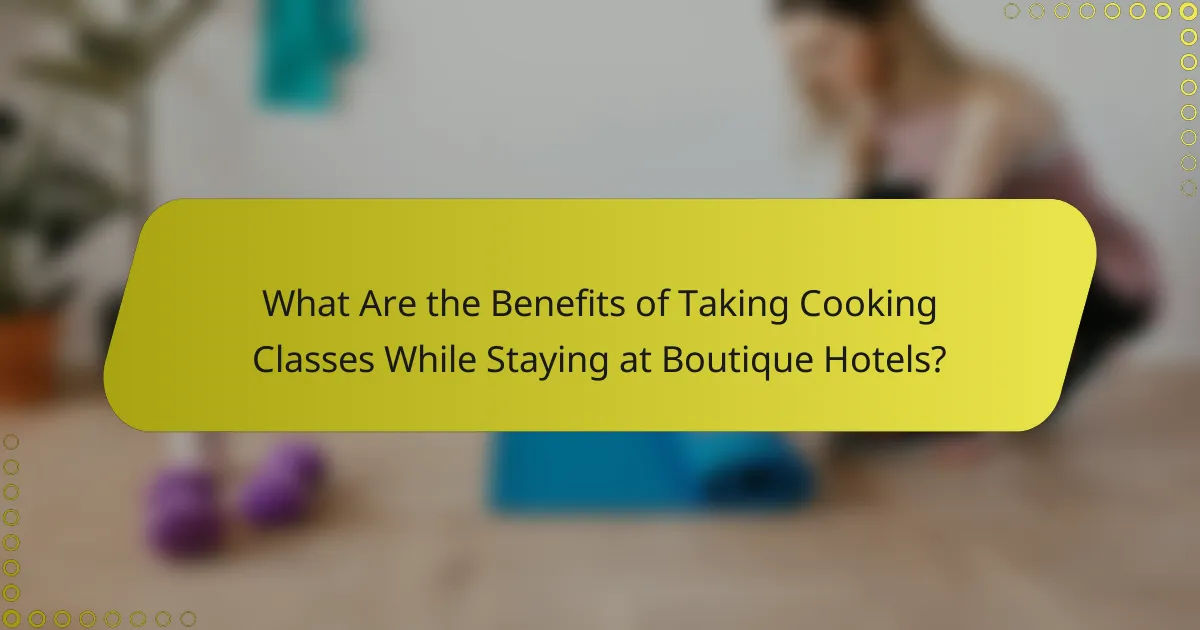
What Are the Benefits of Taking Cooking Classes While Staying at Boutique Hotels?
Taking cooking classes while staying at boutique hotels in Sri Lanka offers a unique opportunity to immerse yourself in local culture and cuisine. These classes not only enhance your culinary skills but also provide insights into traditional cooking methods and local ingredients.
Immersive Cultural Experience
Cooking classes at boutique hotels allow guests to engage deeply with Sri Lankan culture. Participants often learn about the history and significance of various dishes, gaining a richer understanding of local traditions.
Many classes include visits to local markets, where you can interact with vendors and discover the vibrant food scene. This hands-on experience fosters a connection to the community that typical tourist activities may not provide.
Access to Local Ingredients
One of the key benefits of cooking classes in Sri Lanka is the access to fresh, local ingredients. Participants often use seasonal produce sourced from nearby farms, ensuring that dishes are not only authentic but also flavorful.
Learning to cook with local spices and herbs, such as cinnamon and curry leaves, enhances your culinary repertoire. Additionally, understanding where and how to source these ingredients can help you recreate authentic Sri Lankan dishes at home.
